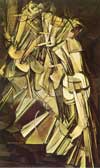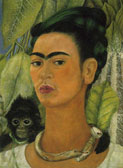
Humanities
HUMN 6
 |
 |
 |
The Shock of the New: From the Modern to the Contemporary
This course is an interdisciplinary and thematic approach to the history of human culture and ideas. This is the first course in a sequence of four courses spanning all of human history (HUMN 1, HUMN 2, HUMN 5, HUMN 6). Each course in the sequence is independent of each other – meaning that you do not need to have taken one course to be successful in another. We encourage you to take the course (or courses) in this sequence that best fits (or fit) your interests.
HUMN 6 explores the role of art in the ‘horrible wonderful’ 20th century (to borrow a phrase from the title of a documentary on Leni Riefenstahl, Hitler’s documentary film-maker) and the nascent 21st century. We will explore art’s involvement in progressive politics and under totalitarianism, art’s contribution to the liberation movements in Asia, Africa, Latin America, the Middle East and art’s influence on our understanding of historical memory and innovative ideas related to philosophy and technology.
Class discussions, projects and lectures address the development of worldviews, moral and ethical values and the arts in Asia, Europe, the Americas and Africa throughout the 20th century and the Digital Age.
Course Objectives
- Engage in critical, creative, and independent thinking.
- Stimulate curiosity about intellectual and artistic life.
- Broaden perspectives on the diversity and dilemmas of human experience and knowledge.
- Apply critical approaches to the analysis of various modes of cultural production in relation to the political, economic, social, and religious context of the time.
- Explain the relationship between art, social organization and political institutions in both Western and non-Western contexts.
- Use diverse historical periods and cultural traditions as a framework for a more complex understanding of the contemporary world.
- Analyze cultural production as both instruments of social control and ideological change.
- Develop the habit of learning and responding to new ideas and challenges.
- Think through moral and ethical problems and to examine one's own assumptions.
- Improve both oral and written communication, especially through critical reading and analysis.

